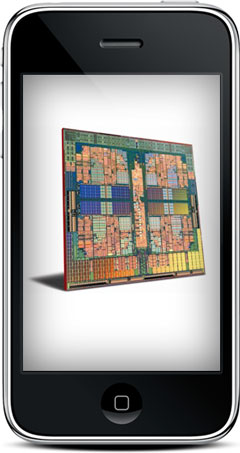
With the purchase of PA Semi and the search for an experienced programmer in processor architecture, more specifically in ARM chips and NEON vector units, Apple has already made it clear that it would be working on the development of a processor suitable for use on the iPhone, making the your gadget even more powerful and with extra differential compared to competitor products.
However, according to Forbes, analyzes made on Wall Street indicate that the processor being developed by the Cupertino company probably was not ready in time for use in the third generation iPhone, which is due to be launched next June 8th, during WWDC ’09.
On the contrary, analysts believe that Apple will adopt a newer and faster version of the chip currently used in its smartphone, which is manufactured by Samsung. With this, Ma's device has greater processing power for applications, tasks running in the background (background processes) and alerts via instant notifications (push). It also allows the iPhone to match its competitors, such as the Palm Pre, which uses a processor (OMAP3430) from Texas Instruments.
Now adopting an update to a processor with which it is already familiar ensures that Apple and its engineers have more time to develop a much more radical solution than consuming millions of dollars and at least two years of development.
The result, however, may be great. Currently the iPhone depends on a chip with only one core. Migrate to a custom processor based on one of the new designs multi-core from ARM “being able to give Ma's smartphone more multi-processing than most netbooks (and even some notebooks),” says Richard Doherty, research director at the Envisioneering group. This will also allow the iPhone to perform tasks such as speech recognition with one core, while displaying images with another, he says.
Such a processor can be used in several products, not just on the smartphone. “Perhaps Apple wants to launch a mobile internet device (smartbook) or your own netbook version, ”adds Strauss. But only open possibilities based on the technology it will have at its disposal.
